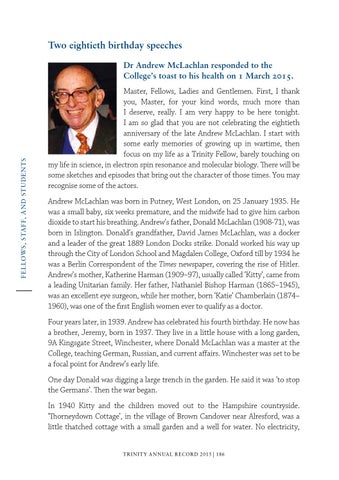Two eightieth birthday speeches
FELLOWS, STAFF, AN D ST U DEN TS
Dr Andrew McLachlan responded to the College’s toast to his health on 1 March 2015. Master, Fellows, Ladies and Gentlemen. First, I thank you, Master, for your kind words, much more than I deserve, really. I am very happy to be here tonight. I am so glad that you are not celebrating the eightieth anniversary of the late Andrew McLachlan. I start with some early memories of growing up in wartime, then focus on my life as a Trinity Fellow, barely touching on my life in science, in electron spin resonance and molecular biology. There will be some sketches and episodes that bring out the character of those times. You may recognise some of the actors. Andrew McLachlan was born in Putney, West London, on 25 January 1935. He was a small baby, six weeks premature, and the midwife had to give him carbon dioxide to start his breathing. Andrew’s father, Donald McLachlan (1908-71), was born in Islington. Donald’s grandfather, David James McLachlan, was a docker and a leader of the great 1889 London Docks strike. Donald worked his way up through the City of London School and Magdalen College, Oxford till by 1934 he was a Berlin Correspondent of the Times newspaper, covering the rise of Hitler. Andrew’s mother, Katherine Harman (1909–97), usually called ‘Kitty’, came from a leading Unitarian family. Her father, Nathaniel Bishop Harman (1865–1945), was an excellent eye surgeon, while her mother, born ‘Katie’ Chamberlain (1874– 1960), was one of the first English women ever to qualify as a doctor. Four years later, in 1939. Andrew has celebrated his fourth birthday. He now has a brother, Jeremy, born in 1937. They live in a little house with a long garden, 9A Kingsgate Street, Winchester, where Donald McLachlan was a master at the College, teaching German, Russian, and current affairs. Winchester was set to be a focal point for Andrew’s early life. One day Donald was digging a large trench in the garden. He said it was ‘to stop the Germans’. Then the war began. In 1940 Kitty and the children moved out to the Hampshire countryside. ‘Thorneydown Cottage’, in the village of Brown Candover near Alresford, was a little thatched cottage with a small garden and a well for water. No electricity, T R I N I T Y A N N UA L R ECOR D 2015 186
